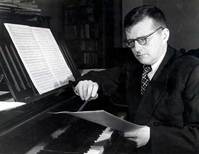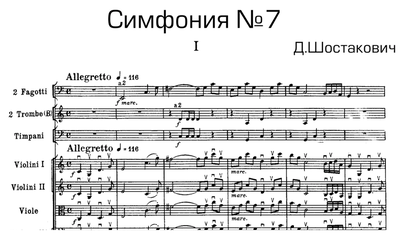The Seventh Symphony

Dmitri Shostakovich’s Seventh Symphony (Symphony No. 7 in C major, Op. 60) dedicated to the city of Leningrad was completed on 27 December 1941. In its time, the symphony was extremely popular in both Russia and the West as a symbol of resistance and defiance to Nazi totalitarianism and militarism. Still today it is regarded as the major musical testament of the 25 million Soviet citizens who lost their lives in World War II due to the German invasion. It is played at Leningrad's Piskariovskoye Cemetery where half a million victims of the 900-day siege of Leningrad are buried in mass graves.
The Seventh was mostly composed in Leningrad in 1941–42, when the city was under siege by the Germans during World War II. Its very composition and performance were hailed as a triumph of Soviet spirit in the face of terrible opposition.
Shostakovich was teaching at the Conservatory when the Germans tried to take the city and, caught up in the patriotic fervor sweeping the nation, tried twice to enlist in the Red Army. He was rejected both times due to his poor eyesight but was accepted by the Home Guard and made a fireman at the Conservatory. Work on the symphony was begun about a month after the initial invasion. Shostakovich, one of Russia’s cultural treasures., was offered an escape to the country in early August but refused it.
After rapidly completing the first two movements, Shostakovich appeared on the radio saying, “An hour ago I finished the score of two movements of a large symphonic composition. If I succeed in carrying it off, if I manage to complete the third and fourth movements, then perhaps I’ll be able to call it my Seventh Symphony. Why am I telling you this? So that the radio listeners who are listening to me now will know that life in our city is proceeding normally.”
The piece was heralded as a resounding success, a masterpiece and a perhaps most importantly, a symbol of the struggle for freedom against the forces of evil.
Click on the sheet music to hear The Seventh Symphony on Youtube.

